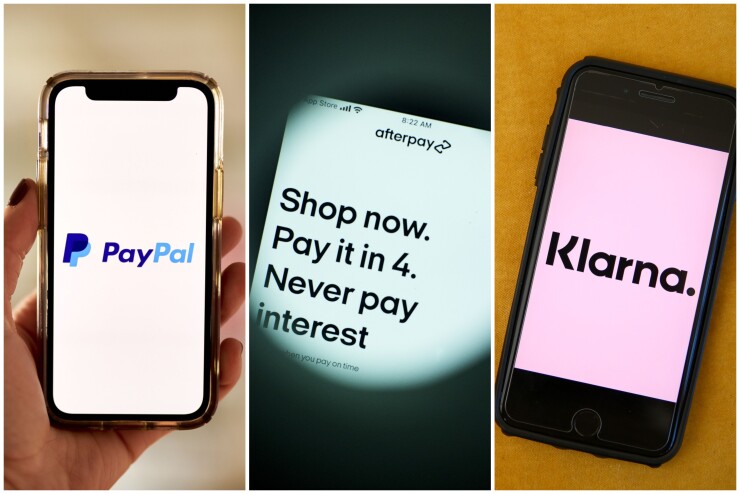In 2020, PayPal vowed to cut off for-profit educational institutions that were offering its consumer credit line product in inaccurate or misleading ways, and the payments giant says its efforts were successful.
But related problems have now cropped up in the buy now/pay later market, where PayPal competes with the likes of Klarna, Affirm and Afterpay, according to a new report by the Student Borrower Protection Center.
The advocacy group’s findings illustrate the challenges that the consumer finance industry faces in policing the line between acceptable commerce and deceptive tactics. Those issues are particularly sensitive in the education finance market, where Biden-era regulators are focusing on protecting student borrowers from unscrupulous operators.

The report focused on schools that are unaccredited or loosely regulated, with classes ranging anywhere from animal healing courses to online certification in real estate and technology fields. It called the loans "shadow student debt" since they do not offer the same protections as the private education loan market, where regulators have put in place rules for disclosures and co-branding between lenders and schools.
“Policymakers and law enforcement at all levels must wake up to the reality of BNPL as an emerging form of shadow student debt and use all of the regulatory, supervisory, and enforcement tools at their disposal to protect borrowers,” the report says.
The for-profit schools in question account for a miniscule share of leading BNPL lenders’ business, but the issue may nonetheless play a role in the Consumer Financial Protection Bureau’s efforts to determine how to regulate the booming sector.
In December, the consumer agency
Much of the advocacy group’s report, issued last week, focused on PayPal. It flagged 30 previously unidentified for-profit schools that advertise either a PayPal Credit line or a separate PayPal BNPL product — known as Pay in 4 — as a way to pay for classes. The list includes a school that offers a $15,000 tattooing course, as well as cosmetology classes elsewhere that cost thousands of dollars.
In a statement, a PayPal spokesperson said the San Jose, California-based company is “focused on ensuring that our services are used for intended purposes.”
“If any organization is found to be using inaccurate, misleading, or otherwise unapproved messaging, marketing, or characterization about PayPal Credit or other credit products, we will quickly work to correct the situation,” the PayPal spokesperson said.
Stamford, Connecticut-based Synchrony Financial, which issues the PayPal Credit line, declined to comment.
The report also called out companies such as Klarna, Afterpay and Affirm for allowing consumers to pay for the for-profit schools’ programs with BNPL products.
In a statement, Klarna said BNPL is a “fairer and more sustainable way to access credit,” arguing that credit card providers “for decades have intentionally kept people in debt.” The company said its BNPL products give consumers clear, short-term repayment schedules, and noted that education-related purchases made up just 0.1% of its purchase volume in 2021.
The majority of that amount was spent at university bookstores, online public speaking tutorials or software to learn foreign languages, a Klarna spokesperson said.
Afterpay said it “was built from the ground-up to help to encourage responsible spending — with consumer protections built into the service.” It pointed to features that keep average transaction values low, limit payment terms to 6-8 weeks rather than allow for longer-term loans and prevent customers who miss a payment from making another purchase. “These rules help ensure customers never revolve in debt,” the company said.
Affirm, meanwhile, said it offers a “transparent and flexible option for paying over time with no late or hidden fees,” and that it underwrites each transaction before extending credit.
“Consumers that use Affirm never owe a penny more than what they agree to up front, even if they’re late or miss a payment, as we never charge any late fees, compounding interest, or deferred interest,” an Affirm spokesperson said, adding that the company’s “success is fundamentally aligned with consumers.”
The Student Borrower Protection Center previously raised concerns about the
It also took issue with what the authors deemed the misleading marketing of deferred interest, a product feature that allows consumers to avoid paying interest for several months, but then charges retroactive interest in the event that borrowers fail to pay off their debt completely during that time.
The new SBPC report made reference to screenshots of certain schools’ websites still showing PayPal Credit as a payment option, but PayPal told American Banker it had cut off their access to the company’s payment services, as it promised to do in 2020.
“Contrary to the latest reporting by SBPC, PayPal Credit is no longer available as a payment option for the over 150 organizations listed in the original report,” a PayPal spokesperson said.
Ben Kaufman, the SBPC’s director of research and investigations, said the most recent report’s finding that new schools are offering PayPal services shows the company is failing to “conduct basic oversight” and forcing consumer advocates to do that work.
“It is beholden on PayPal — what with their massive compliance department — to figure out how to do this right,” Kaufman said. “Because until they do it right, people are going to keep getting hurt.”
PayPal disclosed in a recent securities filing that the CFPB is investigating the “marketing and use of PayPal Credit in connection with certain merchants that provide educational services.” The company has said it is cooperating with the consumer bureau.
The Student Borrower Protection Center credited the CFPB for opening its separate inquiry into the BNPL sector and asked the agency to focus in particular on any fees involved in using the products. It also asked the CFPB to write rules strengthening protections and lender disclosures for students who do not attend traditional colleges.
The CFPB declined to comment.
The CBFP’s general counsel, Seth Frotman, founded the Student Borrower Protection Center in 2018 and was its executive director until last year. Before creating the group, Frotman was the CFPB’s student loan ombudsman.





